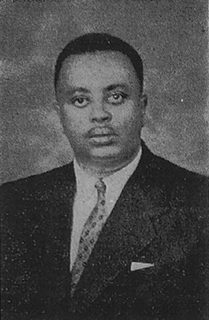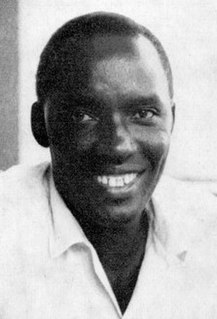Related Research Articles

Louis Rwagasore was a Burundian prince and politician who served as Prime Minister of Burundi from 28 September 1961 until his assassination two weeks later. Born to the Ganwa family of Burundian Mwami (king) Mwambutsa IV in Belgian-administered Ruanda-Urundi in 1932, Rwagasore was educated in Burundian Catholic schools before attending university in Belgium. After he returned to Burundi in the mid-1950s he founded a series of cooperatives to economically empower native Burundians and build up his base of political support. The Belgian administration took over the venture, and as a result of the affair his national profile increased and he became a leading figure of the anti-colonial movement. He soon thereafter became involved with a nationalist political party, the Union for National Progress (UPRONA). He pushed for Burundian independence from Belgian control, national unity, and the institution of a constitutional monarchy. Rwagasore sought to bring UPRONA mass appeal across different regions, ethnicities, and castes, and thus under his leadership the party maintained a leadership balanced between ethnic Hutus and Tutsis, though the latter were usually favoured for more important positions.

Michel Micombero was a Burundian politician and army officer who ruled the country as its first president and de facto military dictator for the decade between 1966 and 1976.
Pierre Ngendandumwe was a Burundian politician. He was a member of the Union for National Progress and was an ethnic Hutu. On 18 June 1963, about a year after Burundi gained independence and amidst efforts to bring about political cooperation between Hutus and the dominant minority Tutsis, Ngendandumwe became Burundi's first Hutu prime minister. He served as prime minister until 6 April 1964 and then became prime minister again on 7 January 1965, serving until his death. Eight days after beginning his second term, he was assassinated by a Rwandan Tutsi refugee.
Joseph Bamina was a Burundian politician and member of the Union for National Progress (UPRONA) party. Bamina was Prime Minister from 26 January to 30 September 1965, and President of the Senate of Burundi in 1965. He and other leaders of the government were assassinated on 15 December 1965, by Tutsi soldiers during a reprisal effort to stop a coup by Hutu officers.

Léopold Bihumugani or Biha (1919–2003) was a Burundian politician. He was appointed Prime Minister 13 October 1965 following the 10 May 1965 legislative election. He was the personal secretary of Mwami Mwambutsa IV previous to his appointment as Prime Minister. He was Prime Minister until a coup on 8 July 1966 when Prince Charles Ndizeye overthrew his father and became Mwami. Mwami Ntare V installed Michel Micombero to the post of Prime Minister.
Joseph Cimpaye was a Burundian politician and writer.
André Muhirwa (1920–2003) was a Burundian politician as a member of the Union for National Progress and the third Prime Minister of Burundi from 19 October 1961 to 7 June 1963. His term coincided with Burundi's independence.
Pié Masumbuko is a Burundian retired politician and physician as a member of the Union for National Progress and the acting Prime Minister of Burundi from January 15 to January 26 of 1965.
On 18–19 October 1965, a group of ethnic Hutu officers from the Burundian military and gendarmerie attempted to overthrow Burundi's government in a coup d'état. The rebels were frustrated with Burundi's monarch, Mwami Mwambutsa IV, who had repeatedly attempted to cement his control over the government and bypassed parliamentary norms despite Hutu electoral gains. Although the prime minister was shot and wounded, the coup failed due to the intervention of a contingent of troops led by Captain Michel Micombero. The attempted putsch provoked a backlash against Hutus in which thousands of people, including the participants in the coup, were killed. The coup also facilitated a militant Tutsi backlash against the monarchy resulting in two further coups which culminated in the abolition of the monarchy in November 1966 and the proclamation of a republic with Micombero as President of Burundi.

The Ikiza or the Ubwicanyi (Killings) was a series of mass killings—often characterised as a genocide—which were committed in Burundi in 1972 by the Tutsi-dominated army and government, primarily against educated and elite Hutus who lived in the country. Conservative estimates place the death toll of the event between 100,000 and 150,000 killed, while some estimates of the death toll go as high as 300,000.
Gilles Bimazubute was a Burundian politician.
Martin Ndayahoze was a Burundian military officer and government official who served variously as Minister of Information, Minister of Economy, and Deputy Chief of Staff of the Burundian National Army. He was the only Hutu military officer to serve in government under President Michel Micombero and frequently warned of the dangers of ethnic violence in his reports to the presidency. He was executed in 1972.
François Rukeba was a Rwandan politician and rebel leader.

Joseph Biroli-Baranyanka or Joseph Biroli was a Burundian politician and was the first Burundian to receive a university education. Born in 1929 to a prominent chief, he was a Ganwa of the Batare clan. He performed well as a student and earned a diploma from the Institut universitaire des Territoires d'Outre-Mer in 1953. After continuing his education at several other universities he took up work for the European Economic Community. In 1960 his brother Jean-Baptiste Ntidendereza co-founded the Christian Democratic Party, and Biroli became the party's president. His main political rival was Prince Louis Rwagasore, a Ganwa of the Bezi clan who led the Union for National Progress. Biroli was friendly to the Belgian colonial administration in Ruanda-Urundi, while UPRONA demanded immediate independence.
Gervais Nyangoma was a Burundian politician and diplomat.
Jean-Baptiste Ntidendereza was a Burundian politician. A co-founder of the Christian Democratic Party, he served as Minister of Interior of Burundi in 1961. He was later convicted of conspiring to kill Louis Rwagasore, a political opponent, and publicly executed.

The Definitive Constitution of the Kingdom of Burundi, sometimes called the "independence constitution", was the constitution of the independent Kingdom of Burundi from its promulgation in 1962 until its suspension in 1966.
Thaddée Siryuyumunsi was a Burundian politician who served as President of the National Assembly from 1961 to 1965.
The Kamenge incidents or Kamenge riots were a series of armed raids and murders conducted in the Kamenge quarter of Bujumbura, Burundi in January 1962. They were perpetrated by militants of the Jeunesse Nationaliste Rwagasore against Hutu leaders of the Syndicats Chrétiens trade union and the Parti du Peuple. The Kamenge incidents were the first major instance of ethnic violence in modern Burundi.

Léon Ndenzako was a Burundian diplomat. He served as the Burundian Ambassador to the United States from 1963 to 1966 and as the Secretary of State for Diplomatic Affairs from July to November 1966.
References
- 1 2 3 4 Weinstein 1976, p. 182.
- 1 2 3 "Joseph Mbazumutima" (PDF). Office of Central Reference Biographic Register. United States Central Intelligence Agency. 28 April 1964.
- ↑ Lemarchand 1970, p. 425.